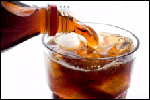 WASHINGTON: Drinking fewer sugary drinks, one of the main sources of sugar in the US diet, can help reduce blood pressure, according to a study Monday in the American Heart Association journal Circulation.
WASHINGTON: Drinking fewer sugary drinks, one of the main sources of sugar in the US diet, can help reduce blood pressure, according to a study Monday in the American Heart Association journal Circulation.
“Our findings suggest that reducing sugar-sweetened beverages and sugar consumption may be an important dietary strategy to lower blood pressure and further reduce other blood pressure-related diseases,” said lead author Liwei Chen of the Louisiana State University health science center.
“It has been estimated that a three-millimeters of mercury reduction in systolic blood pressure should reduce stroke mortality by eight percent and coronary heart disease mortality by five percent. Such reductions in systolic blood pressure would be anticipated by reducing sugar-sweetened beverages consumption by an average of two servings per day,” she added.
Researchers looked at data from a group of 810 adults aged 25-79 with prehypertension and stage I hypertension.
They took part in an 18-month behavioral intervention study with a focus on weight loss, exercise, and a healthy diet to prevent and control high blood pressure.
Consuming more sugar-sweetened beverages had been shown to be associated with an elevated risk of obesity, metabolic syndrome, and type 2 diabetes, according to previous research. But the effect of sugar-sweetened beverages on blood pressure is uncertain, Chen explained.
At the beginning of the study patients drank a third of a liter of a sugary drink each day just under one serving.
At the end of the study they drank half that daily.
The lower consumption was accompanied by lower systolic and diastolic pressure, authors said.
US adults consume an average of 2.3 servings (28 ounces) of sugar-sweetened beverages per day.
Sugar-sweetened beverages in this research were defined as drinks sweetened with sugar or high-fructose corn syrup including regular soft drinks, fruit drinks, lemonade and fruit punch. So-called diet drinks were excluded.
